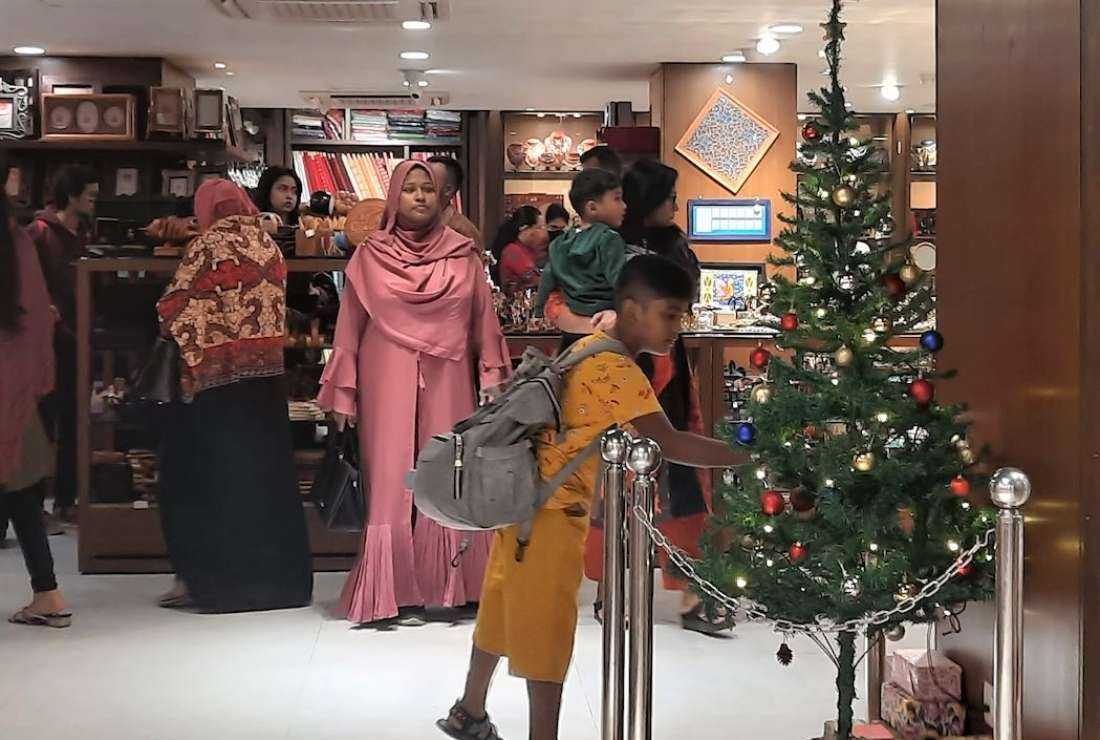Selling Christmas in Muslim-majority Bangladesh
Acceptance of Christmas in mainstream society signals a social change in the country, observers say

A textile shop in the Bangladeshi capital Dhaka is seen decorated with a Christmas tree ahead of Christmas. The once-unknown festival in the Mulsim majority country is fast becoming a season of brisk business. (Photo: Stephan Uttom/UCA News)
Published: December 23, 2022 10:59 AM GMT
Some 20 years ago when Mohibul Hasan began his textile shop in the Mirpur area of Dhaka, Christmas was largely unknown in Bangladesh but now it has become a season for brisk sales.
“If I sell 100 sarees a month, in the week before Christmas it would be around 300 sarees,” the 52-year Muslim said from his shop adorned with Christmas decorations in the capital of the Muslim-majority nation.
The acceptance of Christmas festivities in mainstream society shows a major social change in the country and it could help build a non-sectarian nation, say sociologists and Christian leaders.
The Many Faces of Asian Mary in Asia
and the World
“It is actually a social change and through it, the universality of Christmas is increasing and this change is very positive for us,” said sociology Professor Shah Ehsan Habib of Dhaka University. He said Christmas decorations have become normal in hotels, restaurants, or shopping malls during the Christmas season, which was not the case a decade ago.
“We now see different kinds of Christmas decorations because people like Christmas” in this country for its universal festive spirit, he said.
The city’s top five-star hotel, the Pan Pacific Sonargaon has celebrated
Christmas every year for decades, said Mohammed Nefeuzzaman, its public relations manager.
“Christmas Day is celebrated in our hotel gorgeously. People of all religions celebrate this event together,” he said adding that they organize special programs and “the response has been great.”
Its lobby is decorated with lights of different colors, complete with Christmas wishes and images of a red-and-white-clad Santa Claus.
“Our most popular program is the Kids Carnival, which offers a variety of rides for children on Christmas Day,” he said. They organize magic shows, puppet shows and various rides, including horse rides.
They also arrange buffets with different kinds of food on Christmas Eve and Christmas Day to make “it a universal celebration of people of all religions."
“Kids and adults alike come and have fun … we expect some 1,000 guests this year…. The numbers keep increasing each year,” he said.
Nirmol Rozario, president of the Bangladesh Christian Association, said he has noticed an increase in Christmas decorations in hotels and shopping malls over the past decade or so.
“This sends a good message to people of other religions about Christmas. It will play a major role in building a non-communal country,” he said.
“Until some years ago, people of other religions were unaware of Christmas. But these decorations in these hotels or shopping malls, and media discussions and advertisements have made Christmas a festival known among other religions.”
“This is resulting in a sort of social change and it will bring positive results for our country and society and for Christians,” Rozario told UCA News.
Christians, mostly Catholics, are a tiny minority in Bangladesh numbering some 600,000 in a population of about 165 million.
An estimated 100,000 Catholics live in the capital Dhaka and nearby areas covered by
the Archdiocese of Dhaka. The city also has a floating population of Catholics as hundreds of young people come to study and work in the city from villages.
The increasing number of Christians in the city doing their shopping during the season and the long holidays offer an occasion to boost business.
“Our store as well as other stores get busy especially in the two weeks before Christmas. Our owner also noticed this and brings various new products to the store in advance,” said Mollica Biswas, 23, a Catholic student, who works as a part-time salesperson at a shop in Bashundhara City, the capital's elite shopping mall.
Biswas said she “normally does not see her Christian acquaintances in the shop. But all of a sudden, in the second half of December, I will see several of them in the shop.”
For Catholics like Sowpan Marandy, a cook in a city restaurant, it is a season to buy new clothes for family members before heading to their native village for Christmas.
The 32-year man will travel back to his village in the northern Dinajpur district to spend the holidays with his wife, two children and father.
He said he “bought a saree, shirts-pants for my two sons, shirt for my father from a roadside shop. Nothing for me yet but I have already spent more than budgeted.”
“And, there are more expenses at home. I don't know how to manage it,” Marandy told UCA News.
Latest News


